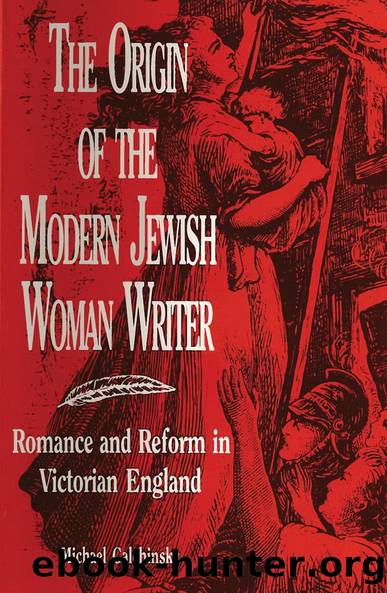The Origin of the Modern Jewish Woman Writer by Michael Galchinsky

Author:Michael Galchinsky [Galchinsky, Michael]
Language: eng
Format: epub
Tags: Social Science, Women's Studies, History, Modern, 19th Century, Jewish Studies
ISBN: 9780814344453
Google: DmZwDwAAQBAJ
Publisher: Wayne State University Press
Published: 2018-02-05T02:39:28+00:00
Advertisement for Grace Aguilarâs Women of Israel, reproduced from the end pages of Home Scenes and Heart Studies (London: George Routledge and Sons, Ltd., 1894). Photo: Michael Dunn.
Exodus tells of Jochebedâs providing no training to Moses, only of her nursing Moses for the daughter of Pharaoh.26 Yet Aguilar expands on Jochebedâs story so that she will exemplify a mother-instructor, training her children in the secret home space away from Pharaohâs eyes to be the future leaders of the Jewish people. Other biographies in the series attempt to show that God cared for women as much as men in the legal, civil, religious, and social systems of the Bible without treating them exactly the same as men; that women can inquire directly from God through prayer just as men can; that women, once having been prophets and judges, ought to have their opinions respected while at the same time recognizing their subordination to men; that women ought not to gossip; that they are âweaker in frameâ and âless mighty in mental powersâ (1:152) than men; and so on.27
Except to argue that God is gender-deaf when listening to prayers, Aguilar is not attempting to argue that Judaism has provided for exactly the same roles and responsibilities for women and men. Rather, God has provided for separate menâs and womenâs spheres, and therefore womenâs struggle for âequal rightsâ is futile. If Marion and Celia Moss, with their transgressive heroines, seek to expand womenâs roles into the public life of the community, Aguilar is interested in maintaining a strict separation between the public and the domestic. Abram and Sarai share âequality,â she says, and yet Sarai âknew perfectly her own station, and never attempted to push herself forward in unseemly counselâ (1:49). Women âin the sight of God, in their spiritual privileges, in their peculiar gifts and endowments, in the power of performing their duties in their own sphere, in their responsibility,â are âon a perfect equality with man,â she insists. âBut I would conjure them to seek humility, simply from its magic power of keeping woman in her own beautiful sphere, without one wish, one ambitious whisper, to exchange it for anotherâ (1:43).
Although Aguilar clearly supports Victorian domestic ideology, the version she advocates is not precisely that of the dominant culture. Her crypto-Jewish tradition inflects her version in a marked manner. That is, Victorian domestic ideology can be reached through a number of different paths, and it is not as monolithic a cultural formation as is sometimes supposed. Typical Victorian domestic ideology is founded on the separation of the public sphere from a sphere conceived of as private. As Nancy Armstrong, Michel Foucault, D. A. Miller, and others have shown, Victorian privacy means precisely that one is not free from being watched by others, but is constantly being policed, if only by the authoritative âeyesâ of a culture one has internalized. In this scenario, âtechnologies of powerâ such as conduct manuals and novels set the patterns by which individuals and families are to
Download
This site does not store any files on its server. We only index and link to content provided by other sites. Please contact the content providers to delete copyright contents if any and email us, we'll remove relevant links or contents immediately.
The Power of Myth by Joseph Campbell & Bill Moyers(1068)
Half Moon Bay by Jonathan Kellerman & Jesse Kellerman(987)
A Social History of the Media by Peter Burke & Peter Burke(987)
Inseparable by Emma Donoghue(983)
The Nets of Modernism: Henry James, Virginia Woolf, James Joyce, and Sigmund Freud by Maud Ellmann(913)
The Spike by Mark Humphries;(812)
The Complete Correspondence 1928-1940 by Theodor W. Adorno & Walter Benjamin(789)
A Theory of Narrative Drawing by Simon Grennan(782)
Culture by Terry Eagleton(776)
Ideology by Eagleton Terry;(743)
World Philology by(719)
Farnsworth's Classical English Rhetoric by Ward Farnsworth(715)
Game of Thrones and Philosophy by William Irwin(712)
Bodies from the Library 3 by Tony Medawar(709)
High Albania by M. Edith Durham(705)
Adam Smith by Jonathan Conlin(695)
A Reader’s Companion to J. D. Salinger’s The Catcher in the Rye by Peter Beidler(688)
Monkey King by Wu Cheng'en(654)
Comic Genius: Portraits of Funny People by(652)
